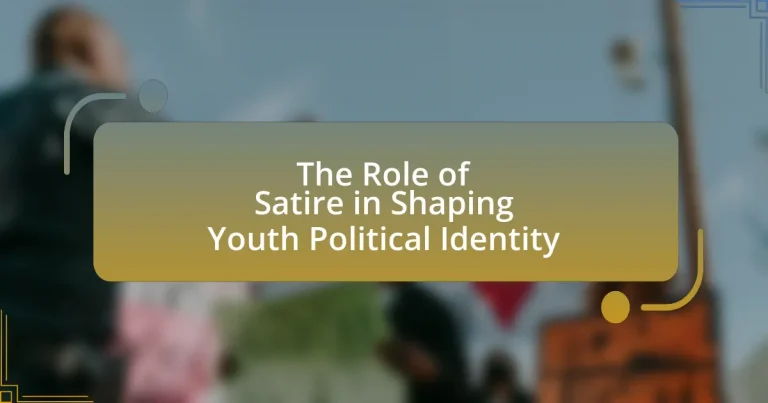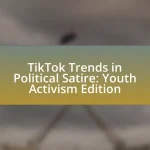The article examines the significant role of satire in shaping youth political identity, highlighting how it fosters critical thinking and political engagement among young individuals. It discusses the influence of satirical content on political awareness, emphasizing that exposure to programs like “The Daily Show” and “Saturday Night Live” enhances political knowledge and encourages civic participation. Key elements of satire, such as humor and relatability, resonate with youth, making complex political issues more accessible. The article also explores various forms of satire, including political cartoons and social media memes, and their effectiveness in addressing political apathy and fostering activism among young audiences.
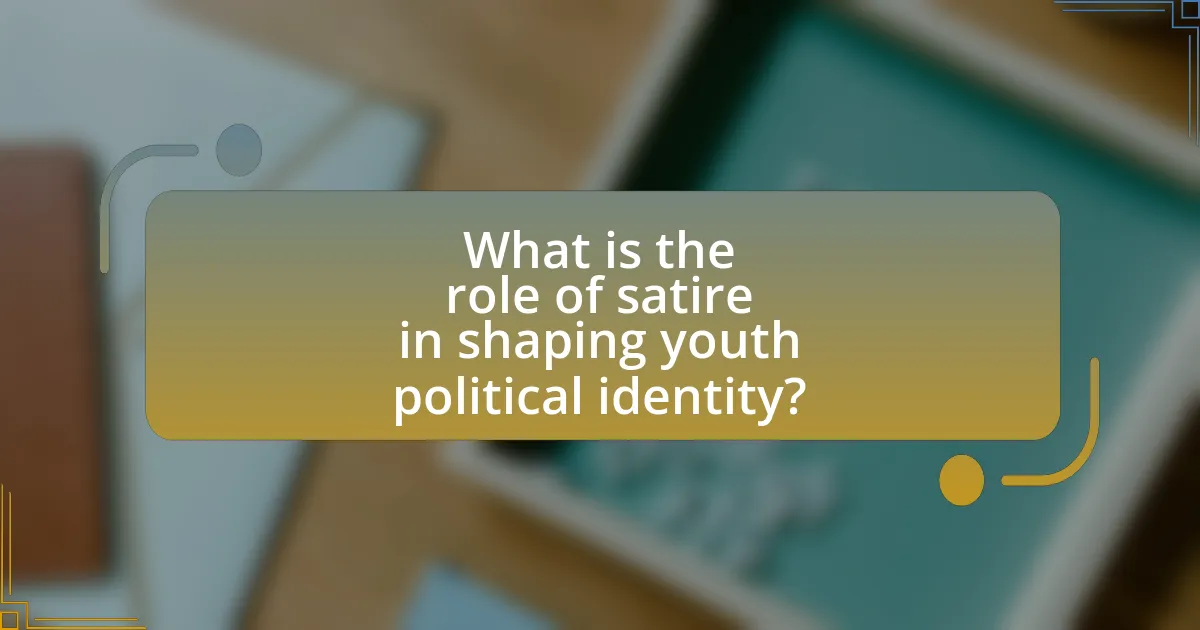
What is the role of satire in shaping youth political identity?
Satire plays a significant role in shaping youth political identity by providing a critical lens through which young individuals can engage with political issues. It encourages critical thinking and skepticism towards authority, as satirical content often highlights the absurdities and contradictions within political systems. For instance, studies have shown that exposure to satirical news can increase political awareness and engagement among young audiences, as evidenced by research from the Pew Research Center, which found that young people who consume satire are more likely to discuss political topics and participate in civic activities. This engagement fosters a more informed and active political identity, as satire not only entertains but also educates youth about the complexities of political discourse.
How does satire influence political awareness among youth?
Satire significantly influences political awareness among youth by engaging them in critical thinking about political issues. Through humor and exaggeration, satire simplifies complex political topics, making them more accessible and relatable to younger audiences. Research indicates that exposure to satirical content, such as programs like “The Daily Show” or “Saturday Night Live,” increases political knowledge and encourages discussions among peers. A study published in the journal “Political Communication” by researchers at the University of Pennsylvania found that young viewers of satirical news shows demonstrated higher levels of political engagement and awareness compared to those who consumed traditional news sources. This suggests that satire not only entertains but also serves as a catalyst for political consciousness among youth.
What are the key elements of satire that resonate with young audiences?
The key elements of satire that resonate with young audiences include humor, relatability, and social critique. Humor engages young people by making complex political issues more accessible and entertaining, which encourages them to reflect on serious topics without feeling overwhelmed. Relatability is crucial, as satire often draws on shared experiences and cultural references that resonate with youth, making the content feel relevant to their lives. Social critique allows young audiences to question authority and societal norms, fostering critical thinking and encouraging political engagement. For instance, shows like “Saturday Night Live” and platforms like social media utilize these elements effectively, leading to increased political awareness among younger viewers.
How does satire differ from other forms of political commentary for youth?
Satire differs from other forms of political commentary for youth by using humor and exaggeration to critique political issues, making complex topics more accessible and engaging. This approach allows young audiences to reflect on societal norms and political behaviors in a way that is often more relatable than traditional commentary, which may rely on straightforward analysis or opinion. Research indicates that satire can enhance critical thinking skills among youth, as it encourages them to question the status quo and recognize underlying truths in a humorous context, as seen in studies like “The Effects of Satire on Political Engagement” by researchers at the University of Pennsylvania.
Why is satire an effective tool for political engagement among young people?
Satire is an effective tool for political engagement among young people because it simplifies complex political issues, making them more relatable and understandable. By using humor and irony, satire captures the attention of youth who may otherwise feel disconnected from traditional political discourse. Research indicates that young audiences are more likely to engage with political content that is presented in a humorous format, as it encourages critical thinking and discussion. For instance, a study by the Pew Research Center found that 61% of young adults reported that satirical news helped them understand current events better. This demonstrates that satire not only entertains but also educates, fostering a more informed and engaged youth electorate.
What psychological effects does satire have on youth political beliefs?
Satire significantly influences youth political beliefs by shaping their perceptions and attitudes towards political issues and figures. Research indicates that exposure to satirical content can enhance critical thinking skills, allowing young individuals to question mainstream narratives and develop a more nuanced understanding of political contexts. For instance, a study published in the journal “Political Communication” by researchers such as Peter J. McCaffrey and others found that satirical programs like “The Daily Show” and “Saturday Night Live” encourage young viewers to engage with political content more actively, often leading to increased political participation and awareness. This engagement can foster a sense of skepticism towards traditional media and political institutions, ultimately affecting their political identity and beliefs.
How does satire encourage critical thinking in political contexts?
Satire encourages critical thinking in political contexts by using humor and irony to challenge prevailing narratives and expose contradictions in political discourse. This form of expression prompts individuals to question the status quo, analyze political messages, and consider alternative viewpoints. For instance, satirical programs like “The Daily Show” and “Saturday Night Live” often highlight absurdities in political behavior, encouraging viewers to think critically about the implications of such actions. Research indicates that exposure to satire can enhance political engagement and awareness, as it stimulates discussion and reflection on complex issues, thereby fostering a more informed electorate.
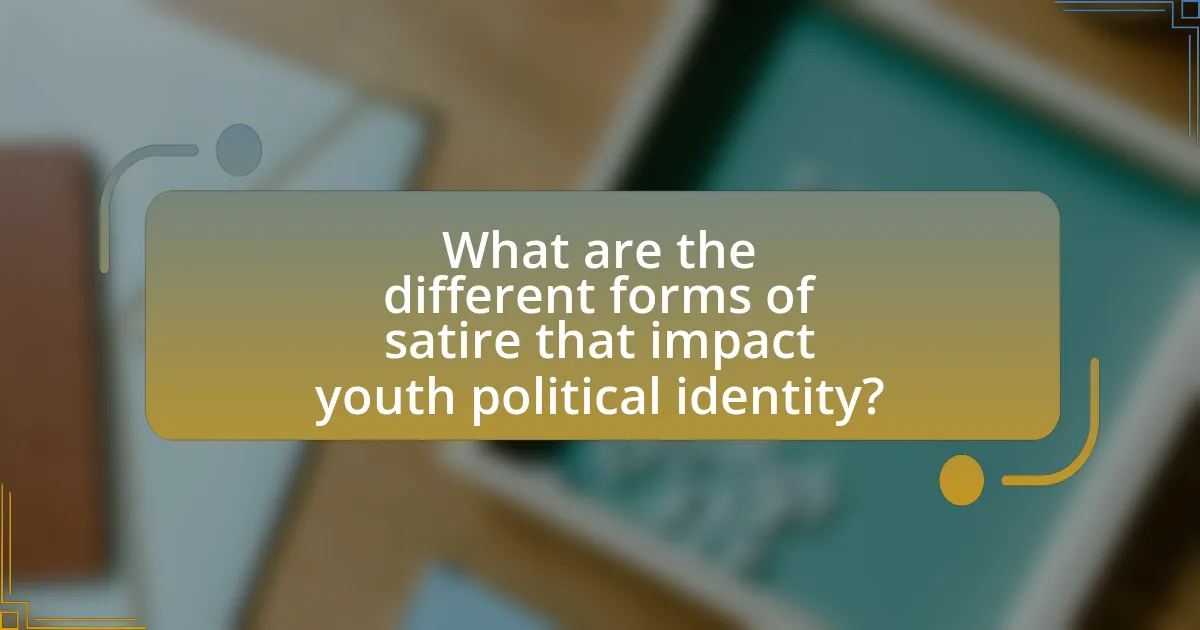
What are the different forms of satire that impact youth political identity?
Different forms of satire that impact youth political identity include political cartoons, parody, and satirical news programs. Political cartoons use humor and exaggeration to critique political figures and policies, shaping young people’s perceptions of political issues. Parody, often found in social media content, mimics and mocks political discourse, encouraging critical thinking among youth. Satirical news programs, such as “The Daily Show,” blend entertainment with political commentary, making complex issues more accessible and engaging for younger audiences. Research indicates that exposure to these forms of satire can enhance political awareness and engagement among youth, as they often provoke discussions and reflections on political matters.
How do various media platforms utilize satire to engage youth?
Various media platforms utilize satire to engage youth by creating relatable and humorous content that critiques societal norms and political issues. Platforms like social media, television, and online streaming services produce satirical shows and memes that resonate with young audiences, often addressing topics such as climate change, social justice, and political corruption. For instance, shows like “Saturday Night Live” and online creators on platforms like TikTok use satire to simplify complex issues, making them more accessible and engaging for youth. Research indicates that satirical content can enhance political awareness and encourage critical thinking among young viewers, as it prompts them to question the status quo and consider different perspectives.
What role do social media and memes play in political satire for youth?
Social media and memes serve as crucial tools for political satire among youth by facilitating rapid dissemination of humorous content that critiques political figures and policies. These platforms enable young people to engage with political discourse in an accessible and relatable manner, often using humor to simplify complex issues. Research indicates that 64% of young adults use social media for news, highlighting its role in shaping political opinions and identities. Memes, in particular, allow for the expression of dissent and solidarity, creating a shared cultural language that resonates with youth. This engagement not only fosters political awareness but also encourages active participation in civic matters, as seen in movements like the 2016 U.S. presidential election, where memes significantly influenced voter sentiment and mobilization.
How do traditional media outlets approach satire in relation to youth politics?
Traditional media outlets often utilize satire as a tool to engage youth in political discourse by highlighting social issues and political absurdities. This approach serves to both entertain and inform younger audiences, making complex political topics more accessible. For instance, programs like “Saturday Night Live” and “The Daily Show” have historically addressed youth-related political issues, such as voting rights and climate change, using humor to provoke thought and discussion among younger viewers. Research indicates that satire can enhance political awareness and participation among youth, as evidenced by studies showing that young people who consume satirical content are more likely to engage in political activities, such as voting or activism.
What types of satire are most effective in shaping youth political views?
The types of satire most effective in shaping youth political views include political cartoons, satirical news programs, and social media satire. Political cartoons utilize humor and exaggeration to critique political figures and policies, making complex issues more accessible and engaging for young audiences. Satirical news programs, such as “The Daily Show” and “Saturday Night Live,” blend entertainment with political commentary, often resonating with youth by addressing current events in a relatable manner. Social media satire, prevalent on platforms like Twitter and TikTok, allows for rapid dissemination of satirical content, fostering discussions and encouraging critical thinking among young users. Research indicates that exposure to satirical content can enhance political engagement and awareness, as evidenced by studies showing that viewers of satirical programs are more likely to discuss political issues and participate in civic activities.
How does parody differ from other satirical forms in political discourse?
Parody differs from other satirical forms in political discourse by specifically imitating and exaggerating the style or content of a subject to create humor, often targeting the original work or figure directly. Unlike broader satire, which may critique societal norms or behaviors without direct imitation, parody focuses on the distinctive traits of the subject, making it more recognizable and accessible to audiences. For instance, television shows like “Saturday Night Live” use parody to mimic political figures, thereby engaging viewers and influencing their perceptions of those figures. This direct engagement through imitation can enhance the impact of the critique, making parody a powerful tool in shaping political identity among youth.
What impact does dark humor have on youth political identity?
Dark humor significantly influences youth political identity by fostering critical thinking and encouraging engagement with complex social issues. This form of humor often addresses taboo subjects, prompting young individuals to confront uncomfortable realities and question prevailing narratives. Research indicates that exposure to dark humor can enhance cognitive flexibility, allowing youth to navigate and interpret political discourse more effectively. For instance, a study published in the journal “Personality and Individual Differences” found that individuals who appreciate dark humor tend to exhibit higher levels of openness to experience, which correlates with progressive political attitudes. Thus, dark humor serves as a tool for youth to explore and articulate their political beliefs, shaping their identities in a nuanced manner.
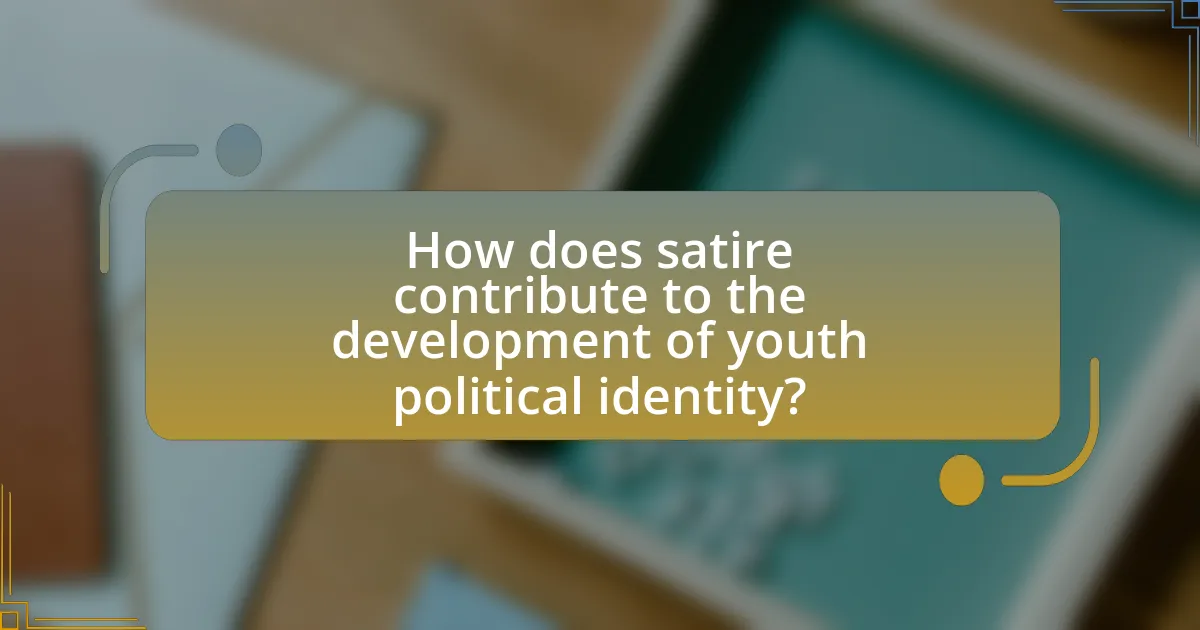
How does satire contribute to the development of youth political identity?
Satire contributes to the development of youth political identity by providing a critical lens through which young individuals can analyze and question political norms and ideologies. This form of expression encourages critical thinking and engagement with political issues, allowing youth to form their own opinions and beliefs. Research indicates that exposure to satirical content, such as programs like “The Daily Show” or “Saturday Night Live,” can increase political awareness and motivate young people to participate in political discourse and activism. For instance, a study published in the journal “Political Communication” found that satirical media can enhance political knowledge and foster a sense of political efficacy among young audiences, thereby shaping their political identities.
What are the implications of satire on youth political participation?
Satire significantly influences youth political participation by engaging young audiences and fostering critical thinking about political issues. Research indicates that satire can enhance political awareness and motivate youth to become more involved in political discourse. For instance, a study by the Pew Research Center found that young people who consume satirical content are more likely to discuss politics with peers and participate in civic activities. This engagement often leads to increased voter turnout and activism, as satire can simplify complex political topics, making them more accessible and relatable to younger audiences.
How does exposure to satire influence voting behavior among young people?
Exposure to satire significantly influences voting behavior among young people by enhancing their political engagement and critical thinking. Research indicates that satire can increase awareness of political issues, as young audiences often find satirical content more relatable and entertaining than traditional news sources. For instance, a study published in the journal “Political Communication” by researchers at the University of Pennsylvania found that exposure to satirical programs like “The Daily Show” and “Saturday Night Live” led to higher levels of political knowledge and increased likelihood of voting among young viewers. This effect is attributed to satire’s ability to simplify complex political topics and provoke discussions, thereby motivating young individuals to participate in the electoral process.
What role does satire play in fostering political activism among youth?
Satire plays a crucial role in fostering political activism among youth by engaging them in critical discourse and encouraging them to question societal norms. Through humor and exaggeration, satire highlights political issues, making them more accessible and relatable to younger audiences. For instance, platforms like social media have amplified satirical content, allowing youth to share and discuss political satire rapidly, which can lead to increased awareness and mobilization around causes. Research indicates that satirical programs, such as “The Daily Show” and “Saturday Night Live,” have significantly influenced young people’s political engagement, with studies showing that viewers of these shows are more likely to participate in political activities, such as voting and activism.
How can satire be used to address political apathy in youth?
Satire can effectively address political apathy in youth by engaging them through humor and critical commentary on political issues. This engagement can stimulate interest and provoke thought, encouraging young individuals to reflect on their political beliefs and the importance of civic participation. Research indicates that satirical content, such as television shows like “The Daily Show” and “Saturday Night Live,” has been shown to increase political awareness and motivate viewers to participate in political activities, as evidenced by a study published in the journal “Political Communication” by authors like Jeffrey M. Berry and Sarah Sobieraj. By presenting political topics in an entertaining format, satire can break down barriers to engagement and inspire youth to take action against apathy.
What strategies can be employed to make satire more relatable to young audiences?
To make satire more relatable to young audiences, creators should incorporate contemporary cultural references and utilize social media platforms for distribution. By embedding current events, popular trends, and relatable experiences into satirical content, creators can engage young viewers who are often influenced by these elements. Research indicates that young audiences are more likely to connect with humor that reflects their realities and social contexts, as seen in the success of platforms like TikTok and Instagram, where satirical content thrives. Additionally, using interactive formats, such as memes or short videos, allows for immediate engagement and sharing, further enhancing relatability and reach among youth.
How can educators incorporate satire into political discussions with youth?
Educators can incorporate satire into political discussions with youth by using satirical media, such as cartoons, videos, and articles, to engage students in critical thinking about political issues. This method encourages students to analyze the underlying messages and biases in political discourse, fostering a deeper understanding of the subject matter. Research indicates that exposure to satirical content can enhance media literacy and promote civic engagement among young people, as evidenced by a study published in the Journal of Communication, which found that students who engaged with satire demonstrated improved critical thinking skills regarding political information.
What best practices can enhance the effectiveness of satire in shaping youth political identity?
To enhance the effectiveness of satire in shaping youth political identity, creators should focus on relatability, clarity, and engagement. Relatable content resonates with young audiences, making complex political issues more accessible and relevant to their experiences. Clarity in messaging ensures that the satire is easily understood, allowing the audience to grasp the underlying political critique without confusion. Engaging formats, such as social media platforms or interactive content, can capture attention and encourage discussion among peers, fostering a community of critical thinkers. Research indicates that youth are more likely to engage with political content that is humorous and relatable, as seen in studies by the Pew Research Center, which highlight the impact of social media satire on political awareness among younger demographics.
How can creators ensure their satire is impactful and accessible to youth?
Creators can ensure their satire is impactful and accessible to youth by using relatable language and contemporary cultural references. By incorporating humor that resonates with young audiences, such as memes or popular trends, creators can engage them effectively. Research indicates that youth are more likely to connect with content that reflects their experiences and social realities, making it essential for creators to stay informed about current issues and youth interests. For instance, a study by the Pew Research Center found that 95% of teens use social media, highlighting the importance of platforms where satire can be shared widely and quickly. This approach not only enhances relatability but also encourages critical thinking about political issues among young viewers.
What common pitfalls should be avoided when using satire in political contexts for youth?
Common pitfalls to avoid when using satire in political contexts for youth include oversimplification, misinterpretation, and alienation. Oversimplification occurs when complex political issues are reduced to trivial jokes, leading to a lack of understanding among youth. Misinterpretation can arise if the intended humor is not clear, causing confusion about the political message. Alienation happens when satire targets specific groups, making some youth feel excluded or marginalized, which can hinder their engagement in political discourse. These pitfalls can undermine the effectiveness of satire as a tool for fostering political awareness and identity among young audiences.
